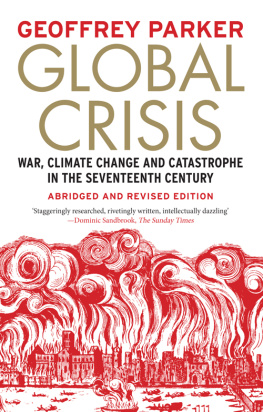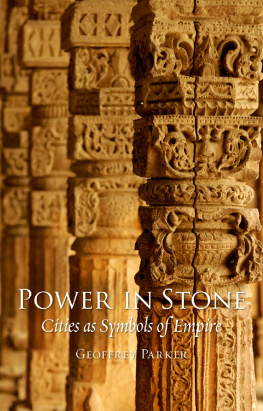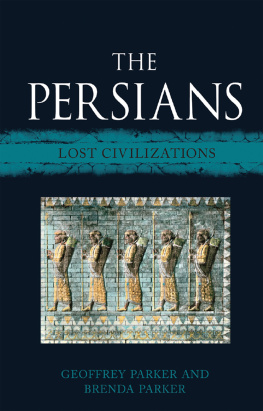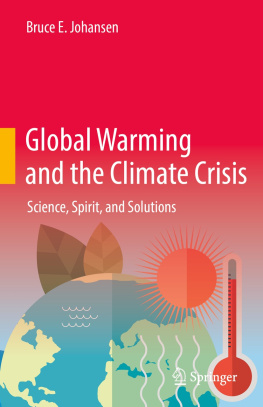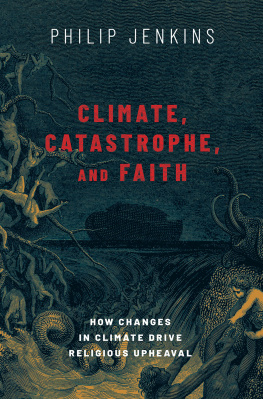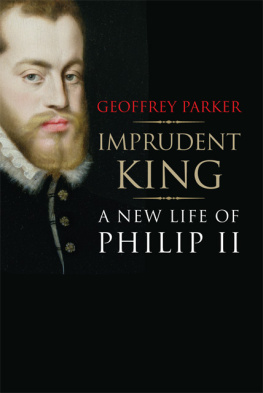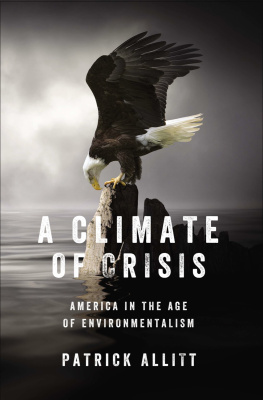

Copyright 2013 Geoffrey Parker
All rights reserved. This book may not be reproduced in whole or in part, in any form (beyond that copying permitted by Sections 107 and 108 of the U.S. Copyright Law and except by reviewers for the public press) without written permission from the publishers.
For information about this and other Yale University Press publications, please contact:
U.S. Office:
Europe Office:
Set in Arno Pro by IDSUK (DataConnection) Ltd
Printed in Great Britain by TJ International Ltd, Padstow, Cornwall
Library of Congress Cataloging-in-Publication Data
Parker, Geoffrey, 1943
Global crisis: war, climate change and catastrophe in the seventeenth century/Geoffrey Parker.
pages cm
Includes bibliographical references.
ISBN 978-0-300-15323-1 (cloth: alkaline paper)
1. History, Modern17th century. 2. Military history17th century. 3. Civil warHistory17th century. 4. RevolutionsHistory17th century. 5. Climatic changesSocial aspectsHistory17th century. 6. disastersHistory17th century. I. Title.
D247.P37 2012
909'.6dc23
2012039448
A catalogue record for this book is available from the British Library.
10 9 8 7 6 5 4 3 2 1
This book is dedicated in admiration to all those who fight multiple sclerosis
It was so harsh a winter that no-one could remember another like it only after Easter could the peasants go to their fields and begin to farm
(Hans Heberle, Zeytregister [Diary], Ulm, Germany, 1627)
The times here are so miserable that never in the memory of man has the like famine and mortality happened
(East India Company officials, letter, Surat, India, 1631)
Those who live in times to come will not believe that we who are alive now have suffered such toil, pain and misery
(Fra Francesco Voersio of Cherasco, Diario del contagio [Plague Diary], Italy, 1631)
There have been so many deaths that the like of it has never been heard in human history
(Hans Conrad Lang, Tagebuch [Diary], South Germany, 1634)
Jiangnan has never experienced this kind of disaster
(Lu Shiyi, Zhixue lu [Diary], South China, 1641)
Among all the past occurrences of disaster and rebellion, there had never been anything worse than this
(County Gazetteer, Yizhou, North China, 1641)
The whole monarchy trembled and shook, since Portugal, Catalonia, the East Indies, the Azores and Brazil had rebelled
(Viceroy don Juan de Palafox y Mendoza, Mexico, 1641)
[These] days are days of shaking and this shaking is universal: the Palatinate, Bohemia, Germany, Catalonia, Portugal, Ireland, England
(Jeremiah Whitaker, Ejrenopojos [The peacemaker], England, 1643)
This seems to be one of the epochs in which every nation is turned upside down, leading some great minds to suspect that we are approaching the end of the world
(Nicandro [The victor], pamphlet, Madrid, Spain, 1643)
'Tis tru we have had many such black days in England in former ages, but those parallel'd to the present are to the shadow of a mountain compar'd to the eclipse of the moon
(James Howell, Collected letters, England, 1647)
There was great hunger throughout the Christian world
(Inscription, Old Sambor Cathedral, Ukraine, 1648)
The pryces of victuall and cornes of all sortes wer heigher than ever heirtofore aneyone living could remember The lyke had never beine seine in this kingdome
(Sir James Balfour, Some shorte memorialls and passages of this yeire, Scotland, 1649)
If one ever had to believe in the Last Judgment, I think it is happening right now
(Judge Renaud de Svign, letter, Paris, France, 1652)
The elements, servants of an irate God, combine to snuff out the rest of humankind: mountains spew out fire; the earth shakes; plague contaminates the air
(Jean-Nicolas de Parival, Abrg de l'histoire de ce sicle de fer [Short history of this Iron Century], Brussels, South Netherlands, 1653)
A third of the world has died
(Abbess Anglique Arnauld, letter, Port-Royale-des-Champs, France, 1654)
I no sooner perceived myself in the world but I found myself in a storm, which hath lasted almost hitherto
(John Locke, First Tract on Government, London, 1660)
Because of the dearth sent to us by God, we wanted to sell our property to our relatives, but they refused, and left us to die from hunger
(Gavril Ni, Moldavian peasant, 1660)
Transylvania never knew such misery as this last year.
(Mihail Teleki, Chancellor of Transylvania, Journal, 1661)
So many prophets and prophetesses arose in all the cities of Anatolia that everyone believed wholeheartedly that the End of Days had come These were indeed miraculous occurrences and wonders, the like of which had never happened since the day the world was created
(Leib ben Oyzer, Beschraybung fun Shabsai Zvi [Description of Shabbatai Zvi], on events in the Ottoman empire in 16656)
The world was aflame from the time I was 15 [1638] to the time I was 18
(Enomoto Yazaemon, Oboegaki [Memoranda], Saitama, Japan, 1670)
Since [1641] I am not afraid of seeing dead people, because I saw so many of them at that time
(Yao Tinglin, Linian ji [Record of successive years], Shanghai, China, c. 1670)
Many people held their lives to be of no value, for the area was so wasted and barren, the common people so poor and had suffered so much, that essentially they knew none of the joys of being alive Every day one would hear that someone had hanged himself from a beam and killed himself. Others, at intervals, cut their throats or threw themselves into the river
(Huang Liuhong, Fuhui quanshu [Complete book concerning happiness and benevolence], about events in Shandong, China, c. 1670)
Contents
Illustrations
Plates
Johannes Hevelius, Sunspot observations in Danzig, 16424. Source: Hevelius, Selenographia (Danzig, 1647), fig. 3. The Thomas Fischer Rare Book Library, University of Toronto.
Leonhard Kern, Scene from the Thirty Years War, 1640s. Source: Kunsthistorisches Museum, Vienna (KK 4363).
King Charles I exchanges his worldly crown for a crown of thorns, 1649. Source: Eikn Basilik, 1649, frontispiece by William Marshall. The Huntington Library, San Marino, California (RB 121950).
Zacharias Wagenaer, Drawing of the city of Edo on 4 March 1657 after the fire, 1651. Source: Edo-Tokyo Museum, Tokyo.
Yang Dongming, Jimin tushuo [Album of the Famished], 1688. Source: By kind permission of Henan Provincial Museum.
A letter left with an abandonned baby, 1628. Source: AHN Consejos, 41,391, unfol.
Weather in China, 1640 and 1641. Source: Zhongguo Jin-wubai-nian Hanlao Fenbu Tu-ji, 91.
A Chinese male undergoes tonsorial castration, 1843. Source: Rev. G. N. Wright, China, III, 50. The British Library Board (Maps 10.bb.31).
The Wine Jew, Germany, 1629. Source: Germanisches Nationalmuseum (HB 2057, Kapsel 1279).
The salt register for Calle Fuencarral, Madrid, 1631. Source: BNE Ms 6760. Courtesy of the Biblioteca National de Espaa.
Spanish stamp duty (Papel Sellado). Source: Hispanic Society of America, Altamira Papers.
A consulta signed by Philip IV, 7 December 1640. Source: AGS GA 1331, unfol., Philip IV's rescript to a consulta from the Junta de Ejecucin, 7 December 1640. Espaa, Ministerio de Cultura, Archivo General de Simancas.
Next page

